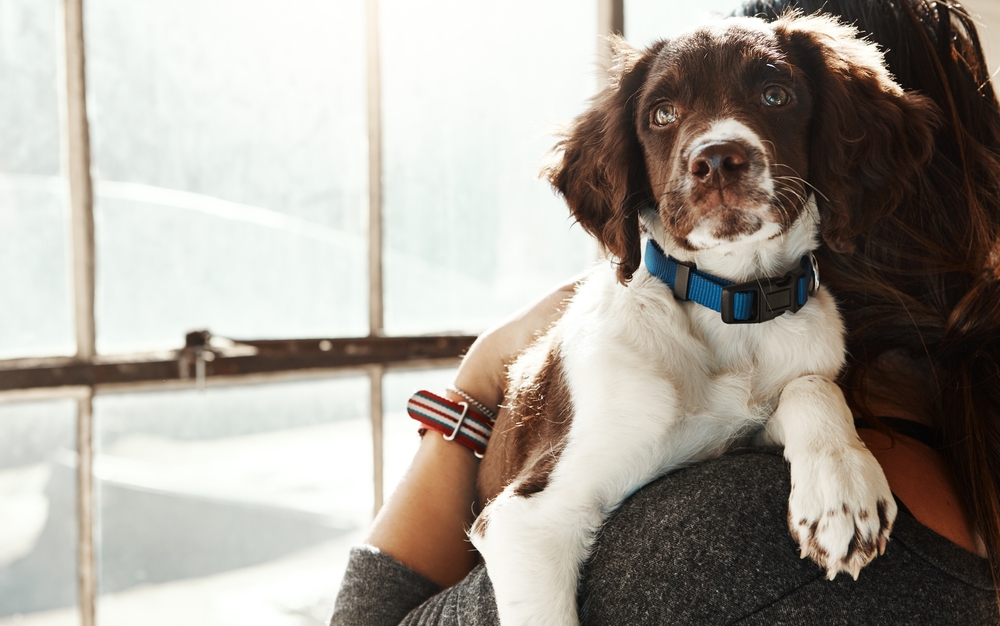Science Confirms: Losing A Dog Hurts Just Like Losing A Human Loved One

There’s a certain kind of silence that follows the loss of a dog—not just the absence of barking or the patter of paws on the floor, but the quiet space where love used to live. For those who’ve experienced it, the grief can be crushing, unexpected in its intensity. And yet, in a world that celebrates resilience and downplays vulnerability, mourning a pet often feels like something to hide. After all, it was “just a dog,” right?
But science—and the human heart—tell a different story. The bond between humans and dogs is not only ancient, it’s deeply emotional, rooted in biology, psychology, and daily lived experience. When that bond is broken, the pain that follows is as real and valid as any other form of loss. Still, many find themselves grieving in silence, caught between profound sorrow and a culture that doesn’t quite know what to do with it.

Why Losing a Dog Hurts So Deeply
If you’ve ever lost a dog, you know the pain isn’t mild or fleeting—it cuts deep, often more sharply than people expect. To those who haven’t experienced it, grieving a dog might seem like an overreaction, something excessive for the loss of “just a pet.” But that framing completely ignores the profound emotional bond that forms between humans and dogs. A dog isn’t just a furry companion—it’s a consistent source of comfort, love, and presence. Psychologist Julie Axelrod points out that when a dog dies, you’re not only mourning the animal—you’re grieving the loss of unconditional love, daily companionship, emotional security, and the unique bond that can feel as close as family, even closer in some cases. That grief can be as intense, and in some instances even more disruptive, than mourning a human loved one, especially because dogs are so deeply embedded into their owners’ daily routines and emotional lives.
What makes the pain more complicated is how society handles it—or doesn’t. While there are well-defined rituals and community support systems in place for grieving human loss, most cultures offer little space for mourning a pet. There’s no public acknowledgment, no leave from work, no ceremony to help process the loss. That absence can leave pet owners feeling isolated and even ashamed for experiencing deep grief, pushing them to suppress or downplay their emotions. Yet research consistently shows that these feelings are not only valid but expected, particularly when the dog was central to the person’s sense of daily structure and emotional grounding. For many, even the silence of the home after a dog’s passing can feel haunting. Some owners report hearing phantom sounds—paws on the floor, a familiar whimper, a jingle of a collar—because the bond with their pet was not just emotional, but sensory and habitual.
Part of why this bond cuts so deep is because of how dogs have evolved alongside us. Over thousands of years, dogs have become finely tuned to human emotions and behaviors. They don’t just live with us—they respond to our moods, learn our routines, and offer companionship without conditions. MRI studies have shown that a dog’s brain lights up in response to their owner’s praise as much as it does to food, and in some cases, more. Dogs recognize faces, interpret emotional expressions, and provide a unique type of relationship that is constant, dependable, and deeply affectionate. When that is gone, it’s not surprising that people find themselves grieving with an intensity that feels indistinguishable from losing a close human friend—or even a family member.
In short, the pain of losing a dog is not only real, it is biologically, psychologically, and emotionally justified. And yet, because it often goes unrecognized by society, that grief is frequently carried in silence. The next time someone mourns a dog, instead of questioning their sadness, we should acknowledge the truth: they haven’t lost “just a pet”—they’ve lost a true and loyal companion who, in many ways, gave more to their lives than some people ever could.

The Science Behind the Human-Dog Bond
The extraordinary connection we feel with dogs isn’t just emotional—it’s deeply rooted in biology and evolution. Dogs are the only species known to have evolved specifically to live alongside humans, not just as working animals, but as companions. Anthropologist Brian Hare’s “Domestication Hypothesis” explains how, over the past 10,000 years, dogs have been selectively bred to read human cues, understand our emotions, and form strong social bonds with us. This isn’t merely a product of training—it’s encoded in their genetics. Dogs aren’t just animals in our homes; they are uniquely wired to connect with us on a level unmatched by any other non-human species.
Modern research confirms just how attuned dogs are to our inner worlds. MRI scans show that dogs’ brains respond to human praise with the same strength as they do to food rewards—sometimes even more so. They recognize our faces, interpret our emotional expressions, and adapt their behavior accordingly. They’ve been shown to understand not only what we do but why we do it—grasping human intentions and even avoiding people who treat their owners poorly. In short, dogs don’t just coexist with us; they actively cooperate, empathize, and protect. This profound level of attunement makes the relationship feel deeply personal and humanlike, which explains why the pain of their absence feels so profound.
This bond is further reinforced by how dogs give us something few humans consistently can: unconditional love and nonjudgmental companionship. A dog doesn’t care if you failed at work, said the wrong thing, or made a mess of your life. To them, you’re still the center of their universe. As the old saying goes, “May I become the person my dog thinks I am.” That sentiment isn’t just poetic—it reflects the powerful role dogs play in how we see ourselves and experience love. Unlike many human relationships, dogs offer a kind of emotional safety and acceptance that’s rare and precious.
So when a dog dies, it’s not just the loss of a pet—it’s the severing of a deep, biologically ingrained connection. It’s the absence of a presence that has been bred over millennia to comfort, understand, and walk alongside us. And as science continues to reveal, this connection is not imagined or exaggerated. It’s very real, and it’s part of what makes saying goodbye so incredibly hard.

Dogs as Family—More Than Just a Pet
For many people, a dog isn’t just an animal—they’re a member of the family. This idea isn’t just emotional—it’s supported by how our brains and behaviors actually process the relationship. In studies of “misnaming,” where people accidentally call someone by the wrong name, dogs are often lumped in with human family members. A parent might accidentally call their child by the dog’s name or vice versa, suggesting that our pets occupy the same mental and emotional category as our closest loved ones. Interestingly, this phenomenon is far less common with cats or other pets, pointing to the unique status dogs hold in the human heart and mind.
The depth of this bond becomes especially clear in the aftermath of a dog’s death. Beyond emotional pain, the loss disrupts daily life in a way that mirrors the loss of a live-in family member. Our routines—morning walks, feeding times, lazy evenings on the couch—are suddenly shattered. Vacations once planned around pet care, regular exercise, even the simple comfort of a familiar face waiting at the door—gone. These aren’t small adjustments; they are major lifestyle shifts. And when the structure of daily life collapses, the emotional distress deepens. The loss is felt not only in the heart, but in the rhythm of every day.
Dogs also serve multiple emotional roles in our lives: companion, confidant, protector, even child. For people who live alone or struggle with mental health challenges, the dog often becomes the emotional anchor—offering stability, presence, and a sense of responsibility. Losing that is not just about losing affection; it’s losing a source of identity and purpose. Many dog owners report that after their dog passes, they still hear phantom footsteps or think they see their pet in the corner of their eye. This is more than just memory—it’s a reflection of how fully integrated the dog had become into the owner’s psychological landscape.
This deep emotional entwinement makes the death of a dog profoundly destabilizing, yet society still tends to treat it as a minor event. That disconnect between lived experience and public perception often leaves grieving dog owners feeling isolated, or even silly for feeling as deeply as they do. But in truth, their grief reflects the loss of a family member—not in metaphor, but in reality. Understanding this helps to validate the emotional experience of countless people who suffer in silence, mourning companions who were never “just pets,” but vital parts of their inner and outer worlds.
Why Society Needs to Rethink Pet Grief
Despite the profound emotional impact of losing a dog, our culture often fails to acknowledge it as a legitimate form of grief. When a human dies, we have rituals—funerals, memorials, bereavement leave—that give people permission to mourn and be supported by their communities. But when a pet dies, especially a dog, those same spaces rarely exist. There’s no obituary in the paper, no formal recognition of the loss. Instead, grieving pet owners are often left to manage their sorrow privately, sometimes even feeling pressured to “move on” quickly, as if their pain is somehow less real or less worthy of attention.
This cultural gap creates a kind of silent suffering. People may feel ashamed for grieving too hard or too long, or they might suppress their emotions altogether because they don’t believe others will understand. But emotional suppression doesn’t erase pain—it often intensifies it. Mental health experts emphasize that disenfranchised grief, which is grief that isn’t socially acknowledged, can be just as damaging as any other kind. When society minimizes pet loss, it invalidates the very real attachment people form with their dogs and deprives them of the support systems that help humans heal after loss.
It’s time to challenge this disconnect. The grief of losing a dog is not only valid—it’s natural, and supported by research. Studies show that people who lose pets often experience the same stages of grief—denial, anger, bargaining, depression, and acceptance—that they do when a human loved one dies. In fact, because the human-dog bond is so deeply intertwined with daily routines and emotional regulation, the loss can lead to symptoms of anxiety, insomnia, or even depression. Yet, many workplaces and institutions still don’t consider pet loss as a sufficient reason for time off, let alone emotional support, which can leave individuals to grieve alone and in silence.
By recognizing pet grief as a legitimate form of loss, we make space for healing. Whether it’s allowing time off work, offering support groups, or simply validating someone’s pain instead of brushing it off, we can help create a culture where no one feels ashamed for mourning the death of a companion who brought them comfort, joy, and unconditional love. It’s not about comparing grief—it’s about honoring connection. And in many cases, the connection with a dog runs as deep as any human bond we’ll ever know.
Loading...

